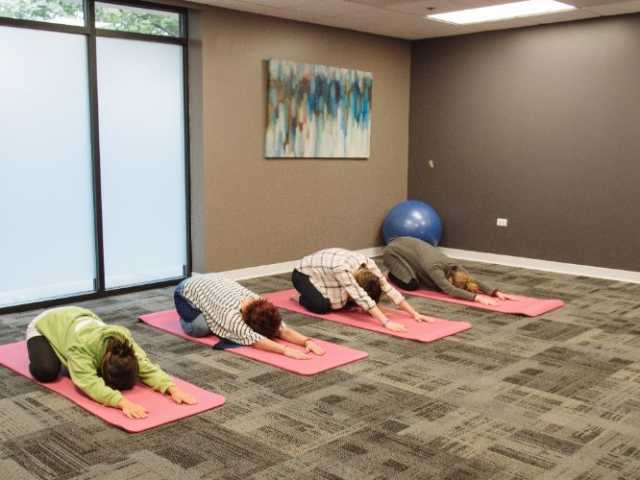View This Center’s Verified License
Learn More
Verified
Verified
Verified
Learn More
About Timberline Knolls
Located just 30 miles southwest of Chicago, Timberline Knolls provides individualized care for adult women and adolescent girls ages 12+ who have been struggling with eating disorders, substance use disorders, and mental health concerns. Timberline Knolls crafted their treatment process to address the specific challenges women and adolescent girls face. Often, when females receive care among other females, it can be easier for them to respond with honesty, which may otherwise feel intimidating in the presence of male residents. Removing this pressure helps women and girls thrive in their recovery experience.
Timberline Knoll’s focus on individualized service means that no two clients will have an identical experience. Their care will be guided by a unique plan that reflects and addresses specific strengths, needs, and goals. Depending on those factors, women's plans may include ambulatory, nonmedical detoxification, medication management, basic medical services, and individual, group, family, and experiential therapies.
A typical day at Timberline Knolls includes multiple group sessions, with experiential, psychoeducational, and process groups. Topics that may be addressed include coping skills, dialectical behavior therapy (DBT) skills, and food discovery. Experiential groups may include recreational activities, yoga, dance and movement, and art therapy. For clients suffering from an eating disorder, they may also participate in dietary consultations and receive monitoring and support during meals and snacks.
To ensure that each person receives the focused, age-appropriate programming that best addresses their needs, Timberline Knoll’s residential services are provided in six lodges. Their lodge format provides a safe and supportive environment where women and girls can receive care alongside others within the same age group. Timberline’s lodges also promote the development of positive peer groups, which help residents learn how to establish healthy interpersonal relationships and begin to trust others for friendship and support.
Read More

Insurance Accepted
Provider's Policy:At Timberline Knolls, our goal is to provide the best treatment for women and girls struggling with eating disorders, addiction, trauma, mood and co-occurring disorders. When you choose Timberline Knolls, our team works with you to make treatment as affordable as possible.
Timberline Knolls treats a variety of eating disorders such as anorexia nervosa, bulimia, food addiction, and body dysmorphia. Specialized staff bring a unique focus in helping clients repair their relationships with food, and address underlying causes of the disorders.

Timberline Knoll’s serene 43-acre campus features both rustic wooded areas and beautifully landscaped grounds. Their treatment rooms, offices, and residences are housed in historically significant buildings dating back to the 19th century, with modern buildings on site as well.

Each woman or girl who receives care at Timberline Knolls completes a thorough assessment to identify her unique strengths, needs, and goals. This information informs the development of her individualized plan. Timberline’s commitment to individualized care means that no two women or girls will have identical experiences.

Recognizing that many women and girls who are suffering from eating disorders, mood disorders, or addiction have a history of trauma, Timberline uses an approach that addresses deeply rooted experiences that may have prevented healing. Compassionate, expert staff help make healing comfortable and lasting.



Founded
2005

Occupancy
50+

Languages
English

Accreditation
Joint Commission

Who We Treat
Women
Adolescents
Adolescents receive the treatment they need for mental health disorders and addiction, with the added support of educational and vocational services.
Women only
Women attend treatment in a gender-specific facility, with treatment delivered in a safe, nourishing, and supportive environment for greater comfort.

Address
40 Timberline Drive, Lemont, IL 60439









Adolescents
Adolescents receive the treatment they need for mental health disorders and addiction, with the added support of educational and vocational services.
Learn More
Co-Occurring Disorders
A person with multiple mental health diagnoses, such as addiction and depression, has co-occurring disorders also called dual diagnosis.
Learn More
Eating Disorders
An eating disorder is a long-term pattern of unhealthy behavior relating to food. Most people with eating disorders have a distorted self-image.
Learn More
Licensed Primary Mental Health
Some primary care providers offer mental health diagnosis and treatment. This can prevent patients from developing more serious conditions.
Personalized Treatment
The specific needs, histories, and conditions of individual patients receive personalized, highly relevant care throughout their recovery journey.
Learn More
Trauma
Some traumatic events are so disturbing that they cause long-term mental health problems. Those ongoing issues can also be referred to as "trauma."
Learn More
Women only
Women attend treatment in a gender-specific facility, with treatment delivered in a safe, nourishing, and supportive environment for greater comfort.
Evidence-Based
A combination of scientifically rooted therapies and treatments make up evidence-based care, defined by their measured and proven results.
Learn More
Experiential
Expressive tools and therapies help patients process past situations, learn more about themselves, and find healing through action.
Learn More
Individual Treatment
Individual care meets the needs of each patient, using personalized treatment to provide them the most relevant care and greatest chance of success.
Learn More
Christian
Through surrender and commitment to Christ, patients refocus the efforts and source of their recovery with clinical and spiritual care.
Learn More
Gender-Specific
Separate treatment for men or women can create strong peer connections and remove barriers related to trauma, shame, and gender-specific nuances.
Learn More
1-on-1 Counseling
Patient and therapist meet 1-on-1 to work through difficult emotions and behavioral challenges in a personal, private setting.
Learn More
Meditation & Mindfulness
A practiced state of mind that brings patients to the present. It allows them to become fully aware of themselves, their feelings, and the present moment.
Learn More
Mindfulness Therapy
This ancient practice can be mental, emotional, and even spiritual. In meditation, you focus your attention on the present moment without judgement.
Learn More
Art Therapy
Visual art invites patients to examine the emotions within their work, focusing on the process of creativity and its gentle therapeutic power.
Learn More
Body Image Therapy
Therapists use cognitive behavior techniques to challenge how patients perceive their body and their worth, rewriting negative thoughts and attitudes.
Experiential Therapy
With this approach, patients heal by doing. Therapists help patients process difficult emotions to speak, using guided activities like art or dance.
Learn More
Expressive Arts
Creative processes like art, writing, or dance use inner creative desires to help boost confidence, emotional growth, and initiate change.
Eye Movement Therapy (EMDR)
Lateral, guided eye movements help reduce the emotional reactions of retelling and reprocessing trauma, allowing intense feelings to dissipate.
Learn More
Family Therapy
Family therapy addresses group dynamics within a family system, with a focus on improving communication and interrupting unhealthy relationship patterns.
Learn More
Motivational Interviewing
Based on the idea that motivation to change comes from within, providers use a conversational framework to discover personalized methods for change.
Music Therapy
Singing, performing, and even listening to music can be therapeutic. Music therapy sessions are facilitated by certified counselors.
Learn More
Psychoeducation
This method combines treatment with education, teaching patients about different paths toward recovery. This empowers them to make more effective decisions.
Recreation Therapy
In recreation therapy, recovery can be joyful. Patients practice social skills and work through emotional triggers by engaging in fun activities.
Learn More
Spiritual Care
Tending to spiritual health helps treatment become more effective, allowing patients to better cope with their emotions and rebuild their spiritual wellbeing.
Learn More
Twelve Step Facilitation
12-Step groups offer a framework for addiction recovery. Members commit to a higher power, recognize their issues, and support each other in the healing process.
Learn More
Acceptance and Commitment Therapy (ACT)
This cognitive behavioral therapy teaches patients to accept challenging feelings and make the appropriate changes to reach personal goals.
Learn More
Group Therapy
Two or more people meet with a therapist together. Patients get valuable peer support, strengthen interpersonal skills, and improve self-awareness.
Personality Disorders
Personality disorders destabilize the way a person thinks, feels, and behaves. If untreated, they can undermine relationships and lead to severe distress.
ADHD, ADD
ADHD is a common mental health condition caused by dopamine imbalance. Common symptoms include inattention, hyperactivitiy, and impulsivity.
Anxiety
Anxiety is a common mental health condition that can include excessive worry, panic attacks, physical tension, and increased blood pressure.
Learn More
Bipolar
This mental health condition is characterized by extreme mood swings between depression, mania, and remission.
Learn More
Depression
Symptoms of depression may include fatigue, a sense of numbness, and loss of interest in activities. This condition can range from mild to severe.
Learn More
Eating Disorders
An eating disorder is a long-term pattern of unhealthy behavior relating to food. Most people with eating disorders have a distorted self-image.
Learn More
Obsessive Compulsive Disorder (OCD)
OCD is characterized by intrusive and distressing thoughts that drive repetitive behaviors. This pattern disrupts daily life and relationships.
Post Traumatic Stress Disorder
PTSD is a long-term mental health issue caused by a disturbing event or events. Symptoms include anxiety, dissociation, flashbacks, and intrusive thoughts.
Learn More
Self-Harm
The act of intentionally harming oneself, also called self-injury, is associated with mental health issues like depression.
Learn More
Trauma
Some traumatic events are so disturbing that they cause long-term mental health problems. Those ongoing issues can also be referred to as "trauma."
Learn More
Alcohol
Using alcohol as a coping mechanism, or drinking excessively throughout the week, signals an alcohol use disorder.
Learn More
Co-Occurring Disorders
A person with multiple mental health diagnoses, such as addiction and depression, has co-occurring disorders also called dual diagnosis.
Learn More
Cocaine
Cocaine is a stimulant with euphoric effects. Agitation, muscle ticks, psychosis, and heart issues are common symptoms of cocaine abuse.
Learn More
Drug Addiction
Drug addiction is the excessive and repetitive use of substances, despite harmful consequences to a person's life, health, and relationships.
Learn More
Heroin
Heroin is a highly addictive and illegal opioid. It can cause insomnia, collapsed veins, heart issues, and additional mental health issues.
Methamphetamine
Methamphetamine, or meth, increases energy, agitation, and paranoia. Long-term use can result in severe physical and mental health issues.
Opioids
Opioids produce pain-relief and euphoria, which can lead to addiction. This class of drugs includes prescribed medication and the illegal drug heroin.
Learn More
Prescription Drugs
It's possible to abuse any drug, even prescribed ones. If you crave a medication, or regularly take it more than directed, you may have an addiction.
Learn More
Religion-Based Track
Patients can join faith-based recovery tracks to approach recovery with others in their faith, healing in a like-minded group with similar goals.
Learn More
Yoga
Yoga is both a physical and spiritual practice. It includes a flow of movement, breathing techniques, and meditation.
Learn More

Sarah Sadkowski
Chief Executive Officer
MA, MS, LCPC

Dr. Ozlem Dubauskas
Medical Director

Aisha Ward
Chief Financial Officer
MBA

Soraya Soto
Director of Admissions
View More Team Members
We love hearing about your treatment experience
Help individuals and families seeking treatment by sharing your first-hand experience with this treatment provider. Review Guidelines.